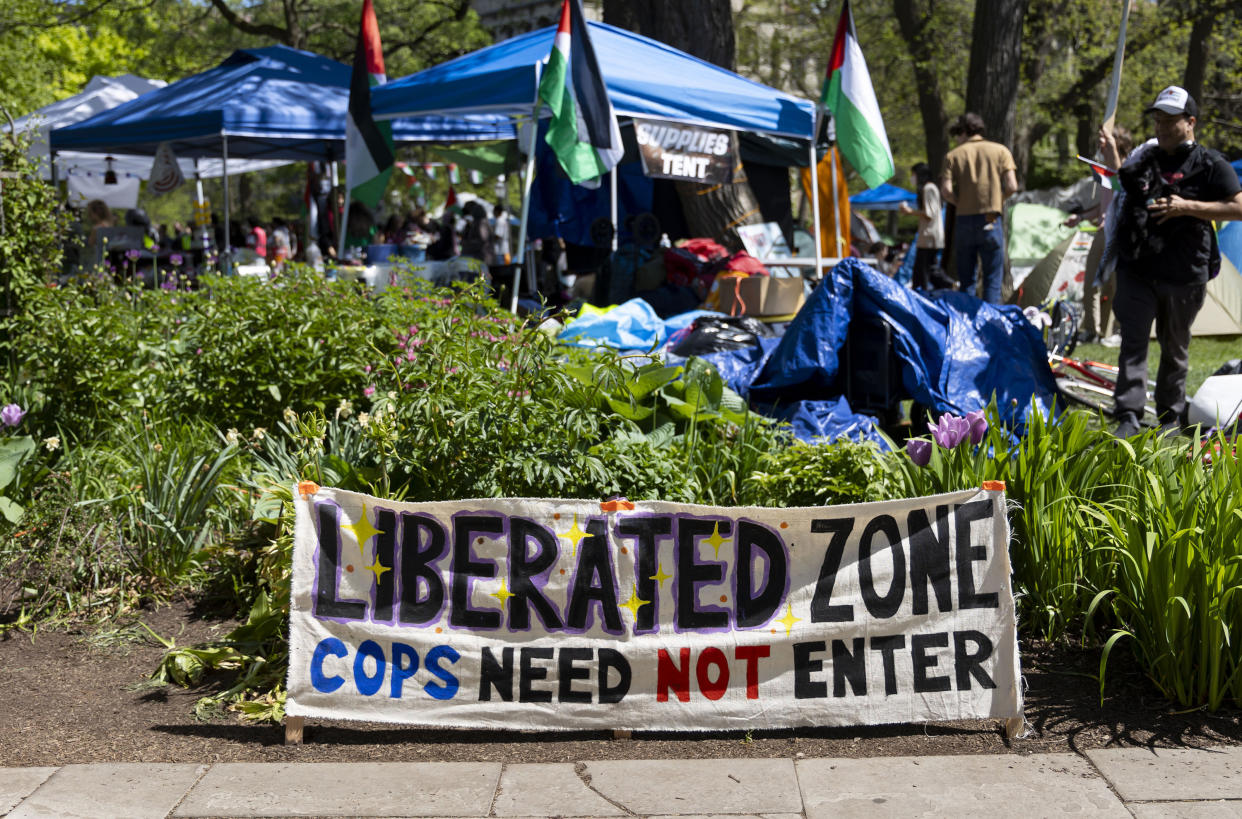University of Chicago prepares to ‘intervene’ to remove pro-Palestine encampment from campus

CHICAGO — The University of Chicago announced it was prepared to “intervene” to remove the pro-Palestine encampment from the school’s Main Quadrangle, president Paul Alivisatos said Friday, claiming student protestors have created a “systemic disruption” on campus.
Meanwhile, tensions heightened Friday afternoon when a group of fraternity brothers marched to the encampment carrying American flags, chanting “USA, USA!” as Muslim students gathered for prayers. A line of cops formed between the groups, sources at campus said. The university asked people to avoid the main quad, saying there were reports of physical altercations.
Hundreds were gathered at the university’s main quad Friday afternoon, with American and Israeli flags hanging from poles at the eastern end.
Student Eliza Ross said Maroons for Israel had organized a picnic near the encampment for anyone who was “proud to be Jewish, proud of Israel” or otherwise wanted to join.
“It was not intended to be a counter protest,” she said
She said a group of fraternity students then planted the American flag near a flagpole where protestors had raised a Palestinian flag Thursday, prompting a larger group to follow.
“There’s a lot of discontent with the fact that this has been allowed to go on unchecked,” Ross said.
Arthur Long, a student and fraternity brother with the university chapter of Fiji, said he’d put out a call to other students to assemble at the quad at 12:30 p.m. to put an American flag by the flagpole. The two groups met near the border of the flagpole and encampment protestors blocked the pole with their bodies, he said.
Students had set up the encampment Monday morning, joining other large-scale protests across the country in demanding the university divest from companies with ties to Israel, including weapons manufacturers supplying arms to Israel’s military amid the mounting death toll in Gaza.
What started as around a dozen tents, has grown throughout the week. It now includes a makeshift food center stocked with hot meals and snacks, a donation tent and an arts and crafts corner, although some students and faculty have said they’ve grown increasingly concerned about the possibility of police intervention.
In the Friday statement, Alivisatos said protestors are “monopolizing areas of the Main Quad at the expense of other members of our community.” He also cited “clear violations of policies,” including disrupted classroom learning, destruction of an approved installation of Israeli flags, disrupting speakers, vandalism and graffiti to historic buildings and “co-opting” a University flagpole to fly a Palestinian flag.
“Fewer police are providing safety patrols in the neighborhoods because they are obliged to be present for the growing 24-hour unauthorized protest. Left to itself, there is no end in sight, and the disruptions will continue to mount,” he said. “The encampment protesters have flouted our policies rather than working within them, despite UChicago being an institution that allows for many ways to express views.”
Alivisatos then seemed to imply that the university will shut down the encampment if an agreement isn’t reached to end it. He didn’t expand on what methods the university might use to intervene.
Many schools, including Columbia University in New York City, have called in law enforcement to douse demonstrations, leading to more than 2,000 arrests nationwide and, at times, violent confrontations with police. Meanwhile, in rarer instances, other schools — including Northwestern University — have struck agreements with protest leaders to restrict the disruption to campus life and upcoming commencement ceremonies.
Representatives with the UChicago United for Palestine said in a news release they had unsuccessful negotiations Thursday with Alivisatos and Provost Katherine Baicker about their demands to divest and disclose its investments. They said Alivisatos refused to “acknowledge the well-documented and widely accepted fact that every university in Gaza has been destroyed by the Israeli Occupation Forces.”
“It is clear to UCUP that the University is negotiating in bad faith,” said Christopher Iacovetti, a student who participated in negotiations. “UCUP refuses to accept President Alivisatos’ repeated condescending offer of a public forum to discuss ‘diverse viewpoints’ on the genocide, as this is clearly a poor attempt at saving face without material change.”
“As the death toll in Gaza climbs to 40,000,” he added, “it is more important than ever for students and people of conscience worldwide to stand in steadfast solidarity with the Palestinian people and against the IOF’s tactics of bombing, imprisonment, torture, starvation and apartheid.”
At an unrelated news conference on Friday, Mayor Brandon Johnson would not say whether he agrees with forcibly removing students.
“We’re going to continue to assess all of these demonstrations,” Johnson said after being asked. “We’re at a critical point in our nation’s history. And so protecting people’s First Amendment right is, of course, paramount. But again, it really requires full assessment.”
Chicago police Supt. Larry Snelling reiterated the support for free speech and added: “What we’re more concerned about than anything else is the safety of everyone. We can talk about the encampments, the question is what’s happening with the encampment. Are there violent acts at these locations? Are people in danger?”
“What we don’t want to do as a police department is escalate any situation unnecessarily,” Snelling said. “So we take our time, we assess these situations, and if it’s not necessary for us to go in and attempt to start removing people, then we won’t. What we’ll do is rely on the universities and the campuses to determine what needs to be done.”
-------
(Chicago Tribune’s Zareen Syed contributed.)
____

